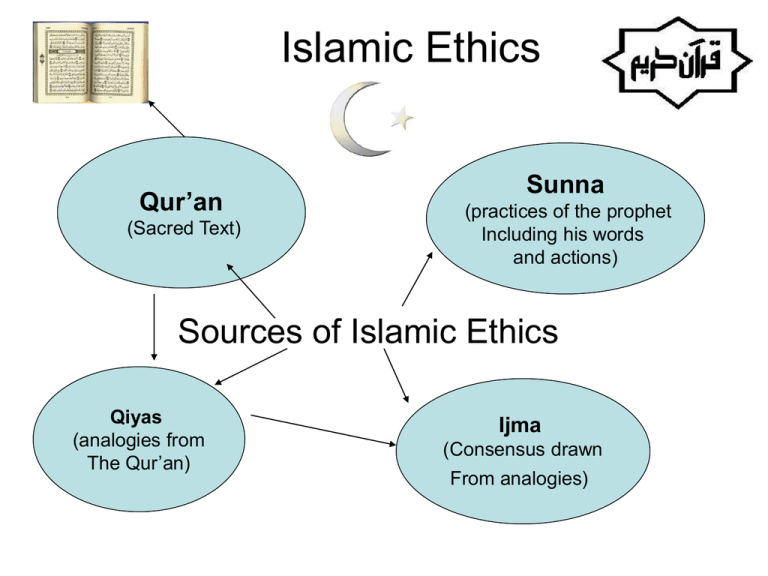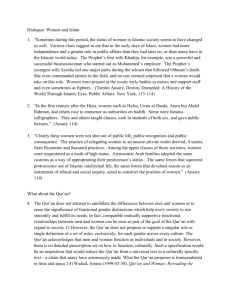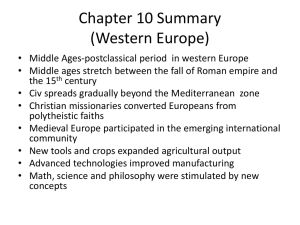Islamic Bioethics
advertisement

Islamic Ethics Qur’an (Sacred Text) Sunna (practices of the prophet Including his words and actions) Sources of Islamic Ethics Qiyas (analogies from The Qur’an) Ijma (Consensus drawn From analogies) Islamic Ethics Links Hadith (collection of words And actions of Mohammad Qur’an (Sacred Text) Sunna (practices of the prophet Including his words and actions) Fiqh Legal rulings by the scholars Qiyas (analogies from The Qur’an) Ijma (Consensus) Fatwa Where fiqh is unclear, a legal specialist delivers a fatwa Shariah Islamic Law Allah Islamic Jurisprudence • Islamic law (Shari’ia) is determined by the Qur’an and through the study of the Sunna and Hadith. • Fiqh – knowledge ,understanding and comprehension • Muslim Jurists in official positions may be titled “Mufti” ( a chief judge). Where Fiqh is unclear, their decision (fatwa) is considered authoritative and must be followed. • Actions governed by tawhid (belief in oneness of God • And Umma ( promotion of unity and harmony) • This is derived from the analogies (qiyas- drawn by the scholars i.e. Islamic lawyers) then becomes known as Islamic Law. (Shari’ah) Sunni Variants in Islamic Jurisprudence • Development of Shari’ah in the Sunni branch of Islam over the ages has also required ijmaa (consensus) and qiyas (analogy), resulting in 4 major Sunni schools of jurisprudence: These are • Hanafi – China, Egypt, Turkey, the Balkans, Indian subcontinent • Maliki – North Africa, West Africa, and several Arab Gulf States. • Shafi’i – Indonesia, Malaysia, Yemen and some parts of Southern India. • Hanbali - Arabia Shi’ia Variants in Islamic Jurisprudence • The Jafari School of Shi’ia Jurisprudence • Within the Shi’ia expression of Islam, the main school is attributed to the sixth Imam, Jaf’ar al –Sadig. • This school uses the Hanbali methodology but places great emphasis on the teachings of the twelve Imams when deciding Fiqh. Underlying guiding concepts for Ethics within Islamic Jurisprudence •The Shi’ias do not accept the ijma, preferring to follow the Ayatollahs (senior Islamic lawyers) who they believe are guided by Divine wisdom. •Sunni Muslims follow the consensus of the ulama (Islamic Lawyers) and this is known as the ijma. This consensus is reached by applying old teachings to new situations which then become Islamic law. This allows Islam to be flexible. • It is mainly in the interpretation of these new issues that most distinguishes Sunni and Shi’ia. Sunni understand the Sunna as Taqlid. Shi’ia follow the Imam. (expert in Islamic Jurisprudence) Sunni, Shi’ite and Sufi Variants • Although recognizing the importance of the Qur’an, Sunni Muslims draw much guidance for ethical behaviour from the Hadith. • Shiite Muslims draw more directly from the Qur’an but remain guided by the Imam, one of the 12 great leaders who carried on the teachings of Mohammad. At a local Mosque, a Mullah will speak with the authority of the last Imam. • Sufis look to their leader, Sheik or Shaykh for moral guidance and they believe divine light shines through him. The sheik requires surrender, love and trust and sometimes fasting so that human desires are curbed and the person becomes more like Allah. Religious Influences Shi’as: SunnisBelieve Muslim leadership passes to caliphs elected from Muslim families Support rule of Abu Bakr, Umar, and Uthman Believe every individual has a direct relationship with Allah Follow ijma (consensus) Accept Muhammad as God’s final prophet Believe that the Qur’an contains the word of Allah Use the 5 Pillars of Faith as a guide for proper behavior Believe that leadership is limited to descendants of Muhammad Reject rule of first three caliphs Feel that imam provides a spiritual link to Allah Follow imams under Ayatollah and reject ijmas The Eight Ethical Principles of Islam These are the Principles for behaviour which govern Muslim ethics. • 1. Set nothing beside Allah • 2. Treat your parents with honour • 3.Do not kill your children for fear of poverty, Allah will provide • 4. Have nothing to do with impurity. Either in the mind or body. • 5. Kill no one protected by Allah, unless you have a proper cause. • 6. Do not touch the orphan’s property, except to increase it. • 7. Respect and fulfill the demands of Justice. • 8. Keep your word, even at the expense of a relative, for that honours Allah. Islamic Bioethics Sources cont. The Morality of the Qur’an reveals Mohammad’s attempt to put submission to Allah into practice. The Sunnah gives direction on moral issues not covered in the Qur’an. It covers “ hadiths”, or “traditions” relating to the actions of Mohammad. Bioethics cont. • The Consensus of the scholars: If after examining the first two sources i.e. the Qur’an and the Sunna, the collections of traditions, and there was still doubt, the Muslims would then consult the ijma or consensus of past generations of muslims. • If public opinion of the Muslim community, as expressed by Muslim jurists agreed upon the rightness or wrongness of an act then it was was upheld, as long as it did not conflict with the Qur’an or the Sunna. Bioethics Cont. Analogy • If all three sources fail to provide an answer to the problem or issue, then Muslims turn to the final ethical source, the Qiyas. • Qiyas formulate a guideline in accordance with the teaching in the Qur’an. E.g. if the Qur’an forbids drinking wine because of its intoxicating effects, the Qiyas would prohibit modern drugs and intoxicating alcohol. Euthansia Human life is considered sacred and therefore Euthanasia is outlawed. The Qur'an also says: "Take not life which Allah made sacred otherwise than in the course of justice" [6:151 and 17:33]. And no person can ever die except by Allah's leave and at an appointed term. Qur'an 3:145 The concept of a life not worthy of living does not exist in Islam. Organ donation is accepted as this practice is to preserve life. Artificial Contraception It is not forbidden to use drugs to prevent pregnancy temporarily particularly if there is concern for the woman’s life as a result of too many pregnancies. However, it is strictly forbidden to take drugs to prevent pregnancy permanently. Two passages from the Qur’an support this. “ God wishes you ease and wishes not your discomfort” and “ He has elected you and has not laid on you any hardship in religion” There are a number of Hadith which indicate the Prophet knew of birth control and approved it in certain instances. Contraception is not prohibited if it is consensual between husband and wife, but conservative Islamic leaders campaign against it thus making population control Ineffective. Contraceptive methods that do not prevent conception but cause an early abortion are not acceptable. Temporary birth control is permitted, Abortion • Abortion and infanticide are explicitly forbidden in Islam. • “ No severer of womb –relationship will ever enter Paradise” Hadith • It is legal in one case only and that is when it endangers the mother’s life. • Permitted up to 120 days after conception as that is when it is believed ensoulment occurs and the rights of the mother take precedence. • Some Muslims believe ensoulment occurs at conception and do not agree with abortion.. • In 2000. Islamic Fiqh academy summarised a number of statements from Qur’an and Hadith one of which stated “the child has a right to survival from its conception.” Assisted Reproductive Techniques • • • • IVF is allowed if the sperm donor is the husband Surrogacy is forbidden Post menopausal conception is not widely accepted Islam is not against treating infertility, it is not seen as a defiance of God's will but to discover the truth about the capability of a couple to achieve a child . • Infertile couples seeking treatment for their infertility are not seen as going against Islamic laws (Shariah). • Moreover seeking treatment for infertility is encouraged and is necessary as it involves the procreation in the couple • Islam rejects human embryo research e.g. frozen eggs left to die. Assisted Reproductive Techniques • The issue of infertility has been addressed in the Quran, Surah 42: 49-50:' to God belongs the dominion of the heavens and the earth; He creates what He wills; He bestows male or female, according to his will; or He bestows both males and females and He leaves barren whom He will; for He is full of knowledge and power.' Assisted Reproductive Techniques • Shi’a is the minority branch of Islam found in Iran, parts of Iraq, Lebanon, Bahrain, Syria, and Saudi Arabia, as well as Afghanistan, Pakistan, and India. • Until recently, most Shi’ite religious authorities have supported the majority Sunni view: namely, they have agreed with Sunni clerics who say that third-party donation should be strictly prohibited.In the late • 1990s, however, the Supreme Jurisprudent of the Shi’a branch of Islam, Ayatollah Ali Hussein Khamanei, the handpicked successor to Iran’s Ayatollah Khomeini, issued a fatwa effectively permitting donor technologies to be used. This fatwa has proved to be very significant for those Shi’a who follow the lead of Ayatollah Khamanei in Iran. Babies born to the infertile father this way take the infertile father’s name. Assisted Reproductive Techniques • Sunni Islam accept IVF if the resultant child is the offspring of the husband and wife. • Likewise a donor egg from another source or the adoption of a donor child from an illegitimate source is also not allowed under Sunni teaching. • All forms of surrogacy and sperm banks are also forbidden. • In many Islamic countries, where the laws of Islam are the laws of the state, donation of sperm was not practiced. AID [Artificial Insemination, Donor] is considered adultery and leads to confusion regarding the lines of genealogy, whose purity is of prime importance in Islam” (134). Cloning • Islam believes that God’s immutable laws are dominant in the nature and human beings cannot willfully create “ unless God, the Lord of all Beings, wills” (81:29) • The will of god in the Qur’an has often been interpreted as the “processes of nature and does not intervene with by human action.” • As a result, in the Islamic perspectives, human manipulation of genes by biological intervention in the early stages of life for the purpose of improving the chances of fertility for a married couple is regarded as an act of faith in the ultimate will of God as the Giver of all life. Genetic Engineering • No genetic modification to change characteristics also not allowed. • The reading of the human gene by mapping out the full human genes is part of man's endeavour to understand himself and appreciate God's powers of creation, as outlined in the Quran (Fussilat 41: 53). And, since this mapping is one way of understanding some hereditary diseases and man's susceptibility to them, it represents a valuable addition to medical and health sciences in their pursuit of preventing certain diseases and treating them, which Islam encourages and recognises. Genetic Engineering. • The Islamic Seminar on genetic engineering agreed that genetic engineering may be used in the prevention, treatment or alleviation of diseases, whether in the form of genetic surgery in which genes are replaced by other genes or genes are implanted in the patient's cells, or when genes are planted in another body to obtain larger amounts of the same gene to be used in the treatment of certain diseases. • 1. God has created man in the best form and elevated him above all other creatures. Any tampering with man's basic constituents or subjecting his body to aimless genetic engineering experimentation, would be in violation of man's God-given dignity, as asserted by the Quran (al-Isra 17: 70).










